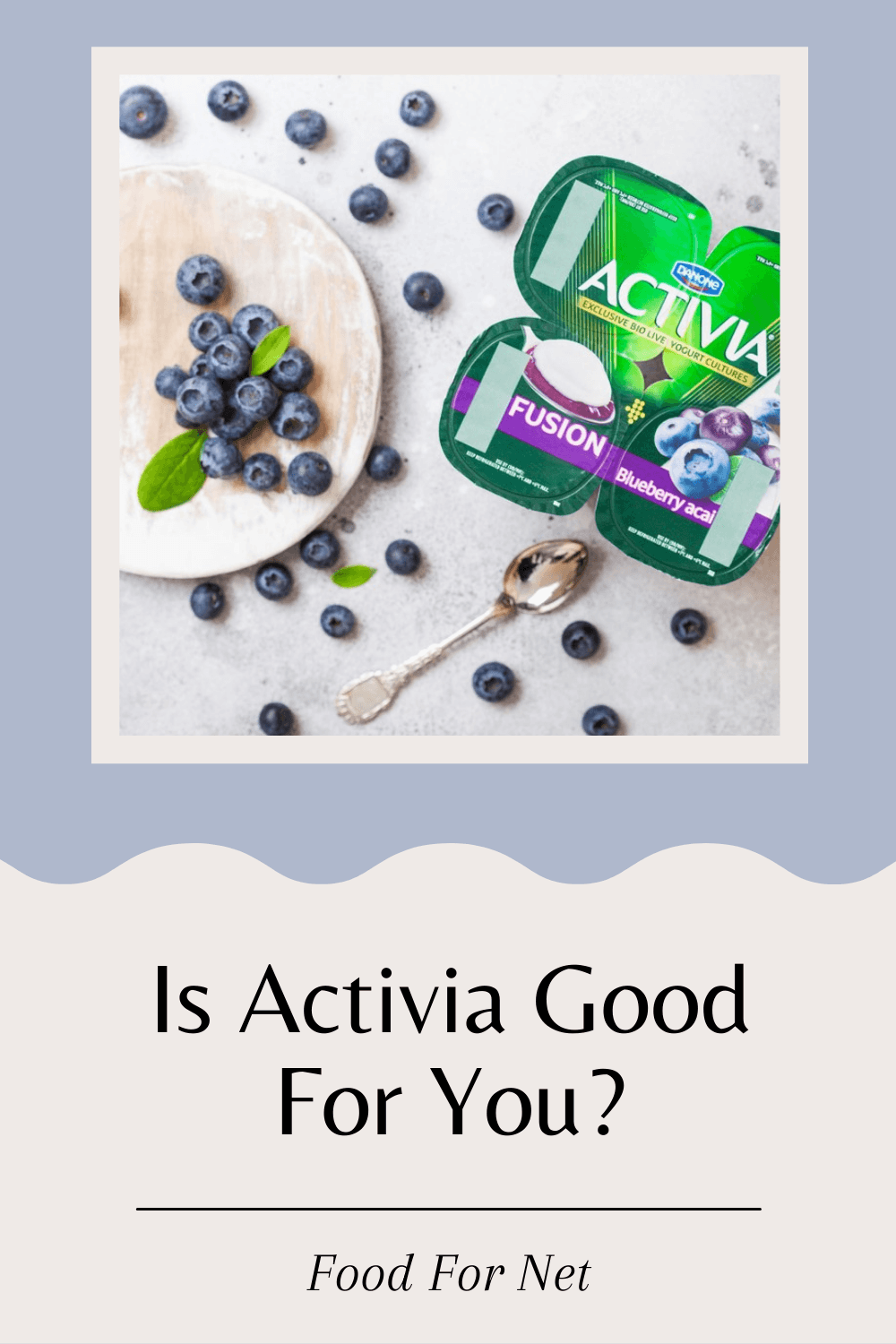
Activia helped make the idea of gut health famous. Their yogurts and probiotic drinks are rich in probiotics and are designed to not only be tasty, but to also promote your gut health. But is Activia good for you, or does the science say something else?
The idea of probiotics isn’t exclusive to Activia. Any yogurt with probiotics should help with your gut health. However, few companies focus on the topic with quite the intensity that Activia does.
Activia products also include the Bifidus Regularis bacteria. You won’t find this one anywhere else, as the company has trademarked the strain name and other companies aren’t allowed to use it.
So, what does all this mean for health? Is Activia good for you and how does it compare to other probiotic products? Answering that question involves thinking about the nutritional profiles of Activia yogurts, their health implications, and whether the probiotic content is actually that powerful.
Is Activia Good For You?
- Activia’s Products
- Benefits Of Activia
- How Activia Could Be Harmful
- Is Activia Better Than Other Yogurts?
- Are Probiotics Always Powerful?
- Can You Still Use Activia If You’re Lactose Intolerant?
- Final Thoughts
Activia’s Products
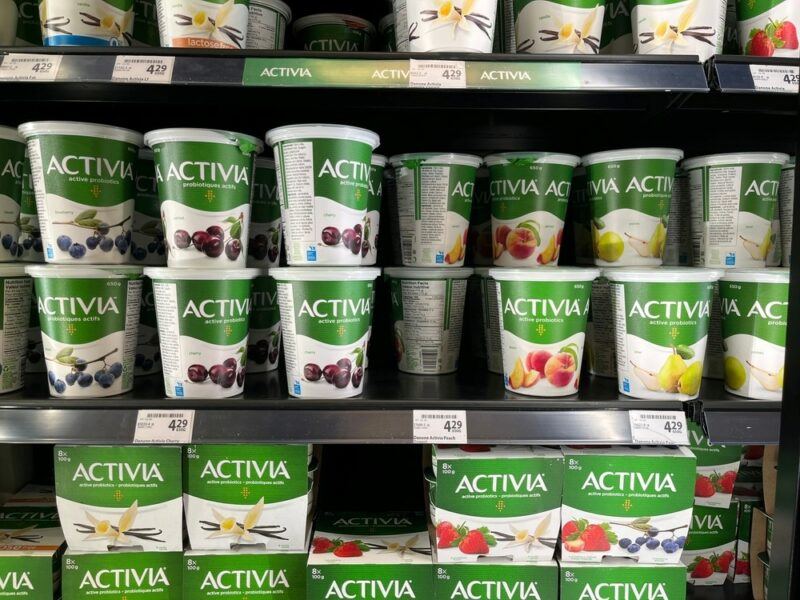
Activia currently has six main types of yogurt, along with four types of probiotic drink. These come in a variety of flavors, like black cherry, blueberry, vanilla, and mango.
These are the different options for yogurt:
- Probiotic Yogurt with Fruit. Contains 90 calories, 1.5 grams of fat, and 12 grams of sugar per 4-ounce serving.
- Probiotic Yogurt with Fiber. This version has roughly the same nutritional profile as the previous one, except that it also contains 3 grams of fiber per 4-ounce serving.
- Probiotic 60 Calories Yogurt. A lower calorie product with 60 calories, no fat, and 7 grams of sugar 4-ounce per serving.
- Probiotic Greek Yogurt. This high protein product gives you 120 calories, no fat, 16 grams of sugar, and 12 grams of protein per 5.3-ounce serving.
- Dairy Free. Here you’re getting 120 calories, 4 grams of fat, and 8 grams of sugar, in a 5.3-ounce serving size.
- Probiotic Low Fat Yogurt. This version of Activia yogurt comes in a large container. Each 6-ounce serving contains 130 calories, 2.5 grams of fat, and 18 grams of sugar.
Then there are the four probiotic drinks:
- Probiotic Drinks. Each of these drinks gives you 160 calories, 3.5 grams of fat, 22 grams of sugar, and 7 grams of protein.
- Probiotic Dailies. These are smaller drinks, at just 3.1 fl. oz each. They contain 70 calories, 1.5 grams of fat, 10 grams of sugar, and just 3 grams of protein.
- Probiotic Smoothies. This time, the drinks offer 130 calories per serving, with 3.5 grams of fat, 13 grams of sugar, and 8 grams of protein.
- Activia+ Lowfat Probiotic Yogurt Drink. These drinks are a little different, as they include added vitamin C, vitamin D, and zinc, a combination that should help your immune system. The drink is low in calories too, with just 70 calories per serving, 1.5 grams of fat, 9 grams of sugar, and 3 grams of protein.
Those yogurts and drinks represent the current selection, but there are always changes over time. This includes tweaks to the recipes, the creation of new products, and the discontinuation of others. Some versions are easier to find than others too, as stores have limited shelf space and often won’t display the entire range.
You’ll also see differences depending on where you live. For example, Canada has lactose free yogurts and some plain ones that have no added sugar at all.
Benefits Of Activia
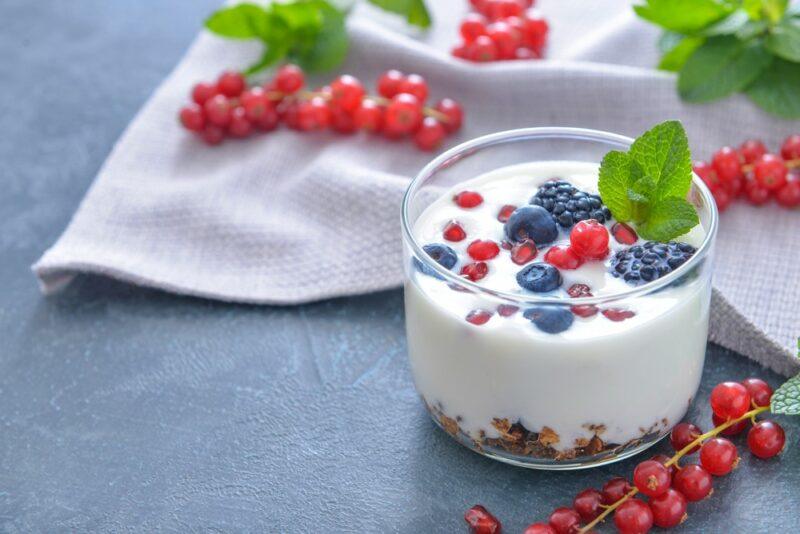
The Probiotics May Improve Health
Let’s start off with the obvious, the probiotics. These are live microorganisms that you find in a variety of fermented foods. Eating live microbes isn’t as weird as it seems, as these little guys are important to our gut health.
While probiotics are still being researched, they’ve already been linked to many possible benefits, including better digestion, decreased diarrhea, improved mental health, decreased inflammation, weight loss, and a better immune system.
These effects don’t all happen all the time. They’re partly dependent on the microbes in the food you’re eating and what your body actually needs.
However, consuming unnecessary probiotics isn’t harmful at all – so it makes sense to keep going with probiotics. Consuming various types of probiotic rich foods may help too, as the specific microbe strains will vary.
May Reduce Digestive Discomfort
Activia’s official claim is that their products can help to “reduce the frequency of minor digestive discomfort”. This refers to symptoms like gas, stomach cramps, and bloating.
In essence, Activia could make your stomach feel better.
These effects may be strongest if you stick to the company’s recommendations of using the products two times a day for at least two weeks. Still, even having the yogurts every so often could offer some benefits.
Also, because yogurt has been fermented, it’s easy to digest. This is useful if you have a sensitive stomach or are feeling nauseous.
However, may is the operative word here. Not everyone experiences digestive improvements from Activia. Some people even get side effects instead.
A Good Source Of Nutrients
Yogurt provides a range of nutrients, including decent levels of vitamin B12, phosphorous, riboflavin, and calcium, along with smaller amounts of plenty of others. Nutrients like these are always critical, as they keep our bodies working well.
There’s a decent amount of protein too, particularly if you choose the Greek yogurt product from Activia. Protein is most famous for its role in muscle building and weight loss, but it has a ton of other functions as well.
Of course, the nutrients and protein vary considerably from one product to the next. That’s a good reason to always check nutritional labels.
Could Promote Health
Dairy products have been researched extensively and associated with a variety of benefits. The most famous is the idea that they can help with your bones, perhaps even reducing the risk of osteoporosis.
The calcium is a major player in this effect. Protein and other nutrients are relevant too. Dairy products can help with your heart too, such as by decreasing blood pressure – an effect that can also lower disease risk.
There may be other health benefits that we’re still learning about. For example, despite fears to the contrary, yogurt may actually lower your inflammation. This is incredible, as chronic inflammation contributes to many modern diseases.
There’s A Dairy-Free Version
There are plenty of reasons to avoid dairy products like yogurt. Perhaps you’re worried about the environmental impact. Perhaps you’re sensitive to lactose. Perhaps you feel that drinking milk from another animal is unnatural.
Whatever the reason, Activia has you covered. Their dairy-free yogurt is made using almond milk, fava bean protein, and a variety of other ingredients. It still contains probiotics, making it relevant for your gut health.
In fact, if you experience side effects with regular Activia, the dairy-free version is worth trying. Doing so would help you to see whether the side effects come from lactose or from the probiotics themselves.
However, while the dairy-free version still contains probiotics, it doesn’t have the same nutrient profile as regular yogurt. As such, you mightn’t see all of the benefits that we’ve been talking about so far.
How Activia Could Be Harmful
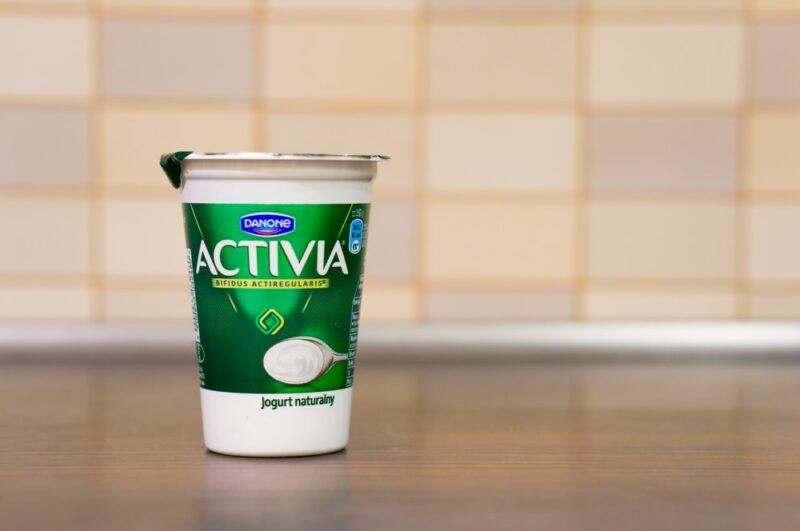
The Sugar Content
For products that are meant to be healthy, Activia yogurts and drinks have a shocking amount of sugar. While some of this sugar simply comes from the milk, the rest is added in to make the yogurts sweeter.
Sometimes this means you’re getting 16 or even 18 grams of sugar in a single serving. It’s easy to see why this is a problem, as sugar doesn’t offer any health benefits at all. Too much of it can increase inflammation and raise your risk of type 2 diabetes and obesity.
The sugar content is also easy to miss, as Activia yogurts sound like they’re very healthy. You might even follow their recommendations of having two yogurts per day, then only notice the amount of sugar later on.
In some countries, Activia does sell plain yogurts with minimal added sugar or none at all. These will generally be better for you than the sweetened versions. However, they’re not always easy to find.
There Are Some Additives
While Activia isn’t overloaded with additives and colors like some brands, a few concerning additives still creep in. For example, their regular yogurt contains carrageenan. This is a common thickener, but there is concern about how it affects your gut health (which is ironic, given that Activia is meant to be helping with your gut).
Their low calorie versions sometimes use artificial sweeteners like sucralose and acesulfame potassium. This is a shame, as there’s no end of controversy about artificial sweeteners and plenty of other ingredients that Activia could have used instead.
Another issue is the natural flavors. While these might sound safe enough, natural doesn’t really mean what you think. Natural flavors come from nature, true, but they’re seriously messed around with in the lab.
In the end, natural flavors aren’t that different than artificial ones. Companies don’t need to disclose exactly what’s in their natural flavor mix either, so you really have no idea what you’re consuming.
Additives like these are still considered safe, especially if you’re only eating them occasionally. Even so, the science is far from complete. There are tons of additives out there and we don’t fully understand their effects.
This might sound alarmist, but chemically produced and tweaked additives are new. We didn’t rely on these for much of human history, so we have no idea what happens if we consume them daily throughout our lives.
Such issues suggest the need for caution with additives. This could mean only consuming them occasionally. After all, additives aren’t essential. There are plenty of delicious yogurts out there that skip the additives entirely.
You Might Get Side Effects
While probiotics are generally safe and well-tolerated, some people experience side effects. These include the problems that the yogurt is meant to be treating, like bloating, stomach cramps, or diarrhea.
The side effects are often simply your body adjusting to the probiotics and they tend to decrease pretty quickly.
There are exceptions though, where some people find that they get consistent side effects from Activia. These side effects could also be related to additives, particularly sucralose. They could also be a sign that you’re lactose intolerant.
If you initially get side effects, it’s worth waiting them out to see whether your body adjusts. But, if you keep getting them, it might be best to ditch Activia entirely. After all, a product that makes you feel sick isn’t likely to be helping your health.
Is Activia Better Than Other Yogurts?
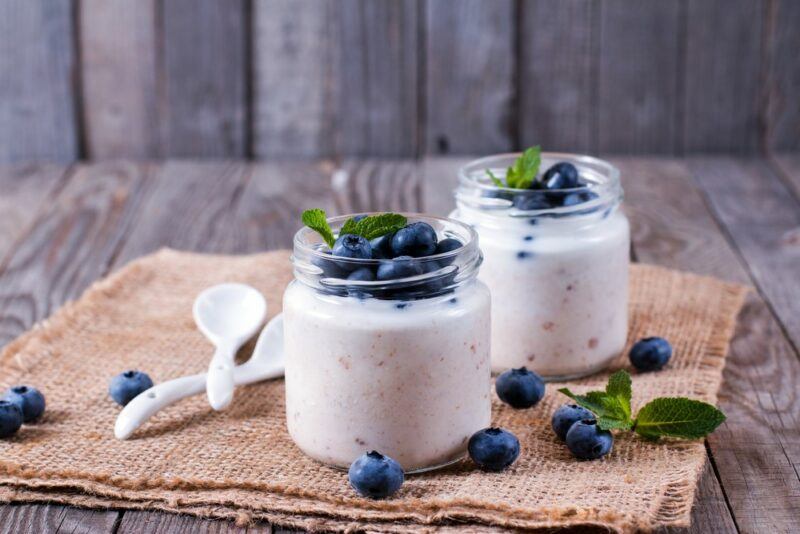
Activia yogurts do contain the Bifidus Regularis bacteria that you don’t find in other types of yogurt. The parent company, Dannon, has researched this type of bacteria, linking it to some benefits, including helping with digestive symptoms.
But, this doesn’t automatically make Activia better than competing products. Few studies have actually compared Activia’s bacteria to the live cultures provided by other companies.
In fact, the evidence is so limited that Activia even had to step down its health claims back in 2010, when they were sued for making unsubstantiated claims. That lawsuit was why early marketing for Activia often said that the products could boost your immune system and regulate digestion, while current claims aren’t nearly as powerful.
For example, the website for Activia currently says “Activia© may help reduce the frequency of minor digestive discomfort”. That’s hardly an exciting health claim, is it?
So, right now, we just know that Activia contains probiotics that could improve your gut health. Other yogurts do as well and some of them have a better nutrient balance and fewer additives.
You might even find that some other types of yogurt are more powerful, as they offer more types of probiotics. While research in this field is still ongoing, it’s clear Activia yogurts don’t stand out as much as the company likes to imply.
Are Probiotics Always Powerful?
The last five years or so have seen considerable focus on the microbes in our gut. This has included the idea of a signaling link between our guts and our brains, a link that could have dramatic impacts on our health.
This link is so significant that we’re sometimes said to have a second brain in our guts, one that can be influenced by the balance of bacteria in there. Increasing your intake of healthy bacteria through probiotics and providing them plenty of food through prebiotics is thought to be the key to improving health.
The idea isn’t just theory either. Research has shown that the right probiotics at the right time can have positive effects.
There’s a catch though.
Probiotics are a little like vitamins and minerals – they’re helpful when you need them and kind of useless when you don’t. Unlike vitamins and minerals, however, you can’t easily test for which microbes you have plenty of and which ones you might need.
The best way around the problem may be to have a variety of probiotic rich foods regularly. Even then, don’t expect miracles. And, if your gut microbiome is already healthy, there’s a good chance that probiotic yogurts like Activia won’t have any effect at all.
Can You Still Use Activia If You’re Lactose Intolerant?
Many people can’t fully digest the lactose protein found in dairy products. Eating dairy anyway can lead to stomach cramps, diarrhea, and other gastrointestinal issues.
While these effects are mostly uncomfortable, rather than dangerous, it’s often easier to simply avoid lactose containing products.
Thankfully, Activia does offer some lactose free options. These aren’t plant-based yogurts. Instead, the enzyme lactase is used to break down the lactose and make the yogurt easier to digest.
You might even be able to digest regular Activia products, as yogurt is often well tolerated by people with lactose intolerance. It’s even possible to train your body to digest lactose by starting with small amounts of dairy foods at a time.
Final Thoughts
Activia does have some interesting benefits, like helping with your gut health, providing nutrients, and even lowering the risk of some diseases. It’s also an easy and delicious snack, one that’s perfect even when you can’t stomach much else.
However, these effects aren’t specific to Activia. They also apply to any other probiotic yogurt and there are plenty of those to choose from. Plus, Activia’s products aren’t ideal nutritionally. Many contain a decent amount of sugar, along with some concerning additives. They’ll still provide some benefits, but they’re hardly the healthiest yogurts on the market.
Frequently Asked Questions
Is Activia A Good Probiotic?
The manufacturers of Activia certainly think their yogurts are powerful, largely because they contain Bididus Regularis. However, this bacterial strain isn’t necessarily better than other probiotics. It’s simply the one that Activia focuses on and has conducted studies on.
Remember also that probiotics are still being researched and may not be nearly as powerful as we often assume. It might turn out that probiotics are only helpful if we consume the exact right type at the right time.
When Is The Best Time To Eat Activia?
Probiotics, including Activia, may function best when you consume them on an empty stomach, as this allows the healthy bacteria to travel the furthest in your body. Because of this, unless you’re fasting, it’s best to eat the yogurt first thing in the morning or last thing at night.
Does Activia Help With Constipation?
Activia is most famous for helping with digestive health, which includes helping with constipation. But, this is an area that the company has got in trouble for before, as there’s little evidence to support the claim.
You may need to experiment for yourself though, as the effect will be influenced by your current gut health and the underlying cause of your constipation.
Is Activia Good For Weight Loss?
Yogurt is often helpful for weight loss, as it gives you plenty of nutrients and protein. The probiotics in Activia could help with weight loss too, especially if your gut microbiome is currently unbalanced. Choosing low sugar Activia products will be the most helpful for weight loss.
That said, Activia isn’t ideal. Other products, particularly Greek yogurt, are lower in sugar and contain more protein, which makes them much better for weight loss.
How Much Sugar Is In Activia?
Activia products are surprisingly high in sugar, with some containing 16 or even 18 grams of sugar per serving. Thankfully, some products are lower, like Activia’s 60 calorie yogurt, which only has 7 grams of sugar per serving.






 Are Fig Newtons Good For You?
Are Fig Newtons Good For You?
Leave a Reply